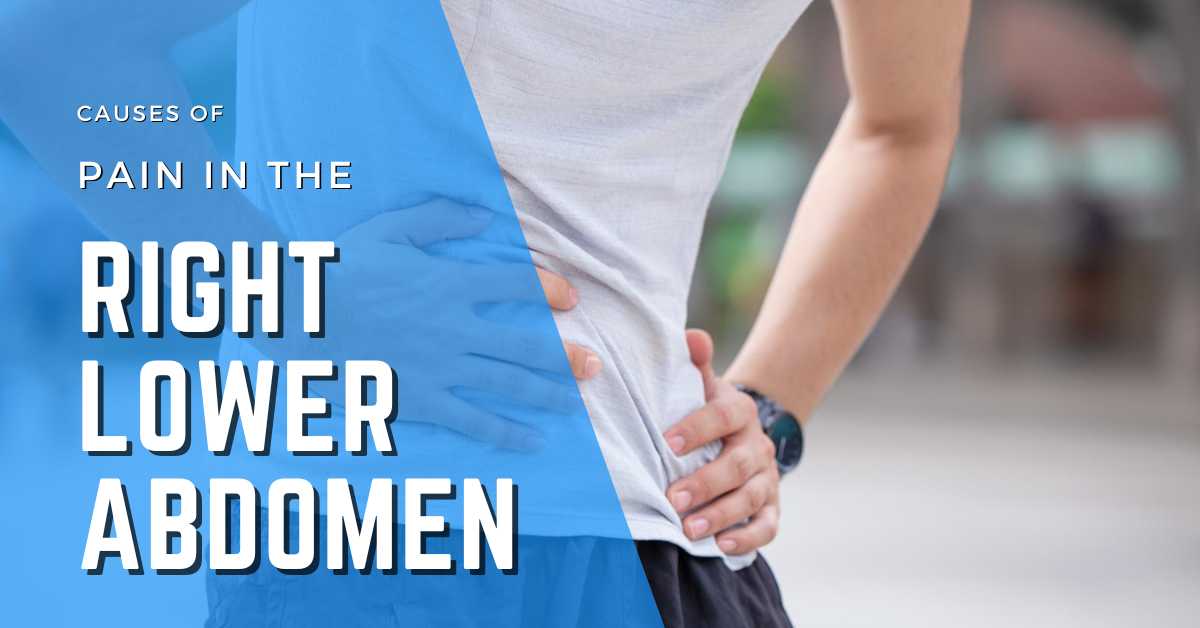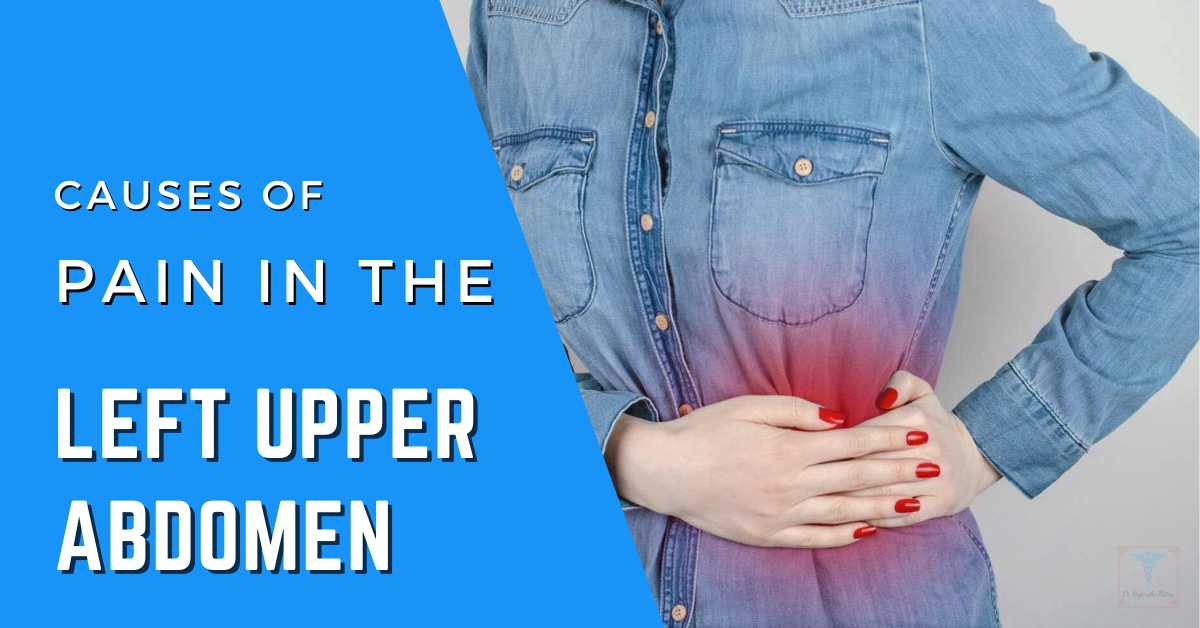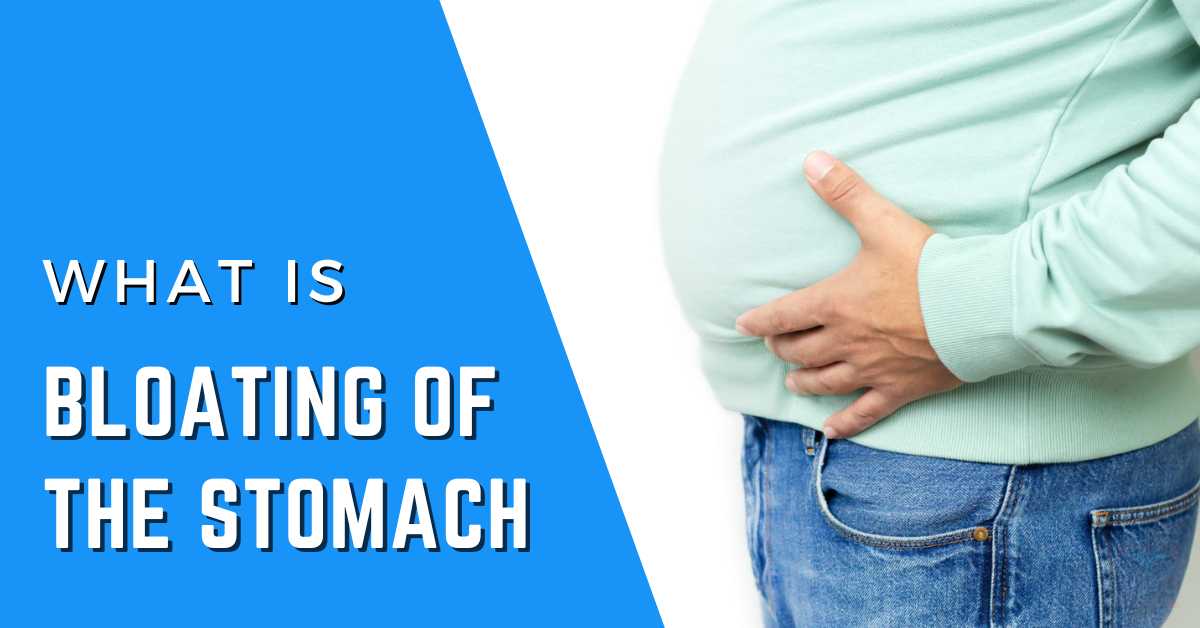Introduction
Your abdomen is divided into four quadrants by two imaginary lines. One line runs vertically, cutting the abdomen into halves. The other line travels horizontally from the bottom of the ribs to the top of the pubic area. This post will focus on the Right Lower Quadrant (RLQ).After reading this article, you will know the organs in that region and the possible reasons you are experiencing pain in that area.
Organs in the right lower Abdomen
The right lower quadrant (RLQ) consists of organs like:
- The Appendix
- Cecum, the lower portion of the Right Colon
- Portions of the Small Intestine
- The Right Kidney
- The Right Inguinal Region
- Right Ovary and the Right Fallopian Tube in Females

Common Causes of Pain in Right Lower Abdomen
Appendicitis
Appendicitis occurs when the appendix becomes inflamed. Appendicitis is one of the most common causes of pain in the lower right abdomen.
It causes pain to develop in the center of the abdomen. The pain becomes more severe as it spreads to the lower right abdomen.
With appendicitis, the typical treatment modality is surgery (appendectomy).
An appendectomy is a procedure used to remove the appendix. Laparoscopic or Keyhole Surgery for the Appendix is the current gold standard treatment.
In rare instances, the doctor will attempt a conservative form of treatment. You will then be asked to return for a follow-up interval appendectomy.
Kidney Infection
Kidney infections caused by bacteria in the urinary system may affect either one or both kidneys.
Patients typically experience pain in the side, lower back, and groin; they also feel pain in the lower abdomen.
Early medical intervention may prevent permanent kidney damage.
Kidney Stones
Kidney Stones develop when minerals and salt build up in the kidney to form hard lumps or stones.
Kidney stone sizes may vary drastically.
Smaller stones can easily pass through the urinary system; however, larger stones tend to get stuck, causing sharp pain around the side, lower back, abdomen, and groin.
The pain’s severity and location change as the stones move throughout the urinary system.
Hernia
A hernia occurs when an internal body part protrudes through a weakened muscle or tissue wall creating a small lump. Hernias are usually harmless and most commonly happen in the abdominal area and the Inguinal areas. They will usually need Surgery.
Irritable Bowel Syndrome
Irritable bowel syndrome (IBS) is a chronic digestive system condition that causes abdominal pain.
Inflammatory Bowel Disease
Inflammatory bowel disease (IBD) refers to conditions including Ulcerative colitis and Crohn’s disease that affect the digestive system. Both conditions cause inflammation of the gut and cause lower abdominal pain.

Causes of Pain in Right Lower Abdomen Affecting Women
Ovarian Cyst
Cysts are sacs that form on the ovaries. They are usually harmless, but the larger ones cause a sharp or dull pain in the abdomen.
Endometriosis
Endometriosis is a chronic condition that occurs when the womb lining tissue exists in other areas, such as the ovaries or the stomach. It causes pain in the lower abdomen or back.
Pelvic Inflammatory Disease
Pelvic inflammatory disease defines infection of the genital tract, usually causing abdominal pain.
Ectopic Pregnancy
An ectopic pregnancy occurs when a fertilized egg (embryo) is present outside the womb. The embryo often develops in the fallopian tubes and can cause pain in the abdomen. This can develop into a life-threatening emergency.
Ovarian Torsion
Ovarian torsion is when the ovaries become entangled or twisted upon themselves, restricting blood flow and causing severe pain in the lower abdomen.

Causes of Pain in Right Lower Abdomen Affecting Men
Inguinal hernia
Inguinal hernias result when fatty tissue or a part of the bowel pushes through passages located in the lower abdomen resulting in a small lump developing at the top of the thigh. Typically occurring in males, inguinal hernias are the most common hernia type, and they cause abdominal pain. The only treatment is Surgery.
Testicular torsion
Testicular torsion is when the spermatic cords attached to the testicles become twisted, restricting blood flow. Testicular torsion causes abdominal pain and other symptoms like nausea and vomiting. This is a surgical emergency and needs urgent surgery to save the testes.

Common Symptoms of Pain in Right Lower Abdomen
All of the conditions above result in different types of pain with varying severity in the Right Lower Abdominal Quadrant. The pain duration also varies, ranging from hours to years in some instances, if left untreated. Other associating symptoms of right lower quadrant pain include:
- Fever – Found in cases where the pain results from an infection.
- Diarrhea, constipation, nausea, vomiting – Found in conditions affecting digestion.
- Blood in the urine, pain when urinating, persistent urination, persistent urge to urinate, smelly or cloudy urine – These symptoms are linked to urinary tract conditions, including those affecting the kidney, like kidney stones and kidney infection.
- Rapid weight loss – linked to Irritable bowel disease (IBS)
- Pain During Menstrual Periods-Pain when urinating or emptying bowels during a period, abnormally heavy or painful periods, bleeding between periods or during and after sex, typical signs of pregnancy, such as a missed period, vaginal bleeding, or brown discharge. – These problems are linked to issues with the reproductive system or infection
- Pain around the shoulder– Linked to ectopic pregnancy
- Swelling in the scrotum– Scrotum swelling is linked to testicular torsion.

When to see a Doctor for Pain in Right Lower Abdomen ?
If you experience right lower quadrant pain that extends for a few days, you should see a doctor, even if the pain is not severe.Seeking medical attention becomes more urgent if, in combination with the pain you are experiencing:
- Fever
- There is a difficulty, pain, or bleeding when urinating or during sex
- Swelling of the scrotum
- Severe pain.

Investigations done to diagnose causes of Pain in Right lower abdomen
Your doctor will ask you a series of questions and review your medical history; your doctor will also do a physical examination and may request other tests based on your symptoms.The tests may include:
- Urinalysis– to check the urine color and determine if your kidney is the problem.
- Imaging tests– ultrasounds, X-Rays, or CT scans help health care professionals to visualize the inside of your organs and identify stones or other possible causes of pain.
- Colonoscopy– used for checking your colon for ulcers, lesions, or possible cancer.
- Blood tests– check primarily for inflammation or infection and liver dysfunction.
- Stool culture– to determine if there is an infection in the stool.

Treatment Options for Pain in Right Lower Abdomen
Painkillers help with pain relief, but doctors may prescribe more potent medication based on the cause of the pain.Here are some treatment forms that you may undergo to remedy the pain:
- Antibiotics – used in cases of infection.
- Radiation & chemotherapy – used for cancer-caused pain.
- Surgery – To remove stones. An appendectomy is used to remove the appendix and inguinal hernia repair. A partial colectomy is used to remove the affected part of the colon in cases of IBD. For ectopic pregnancies, salpingectomy is used to remove the affected tube.
- Antacids and other acid-reducing medications– Used for indigestion-caused pain.
Conclusion
Right lower quadrant pain causes are many; they vary in type and severity.It’s best to seek medical attention at the first opportunity since getting an early diagnosis and treatment reduces complications and medical costs.Some pain-causing conditions may resolve without treatment. At times you may no longer feel pain, but the disease or infection is silently harming you.See your doctor ASAP to protect your health and well-being. Don’t hesitate to contact me with your questions; I am always happy to help.
















